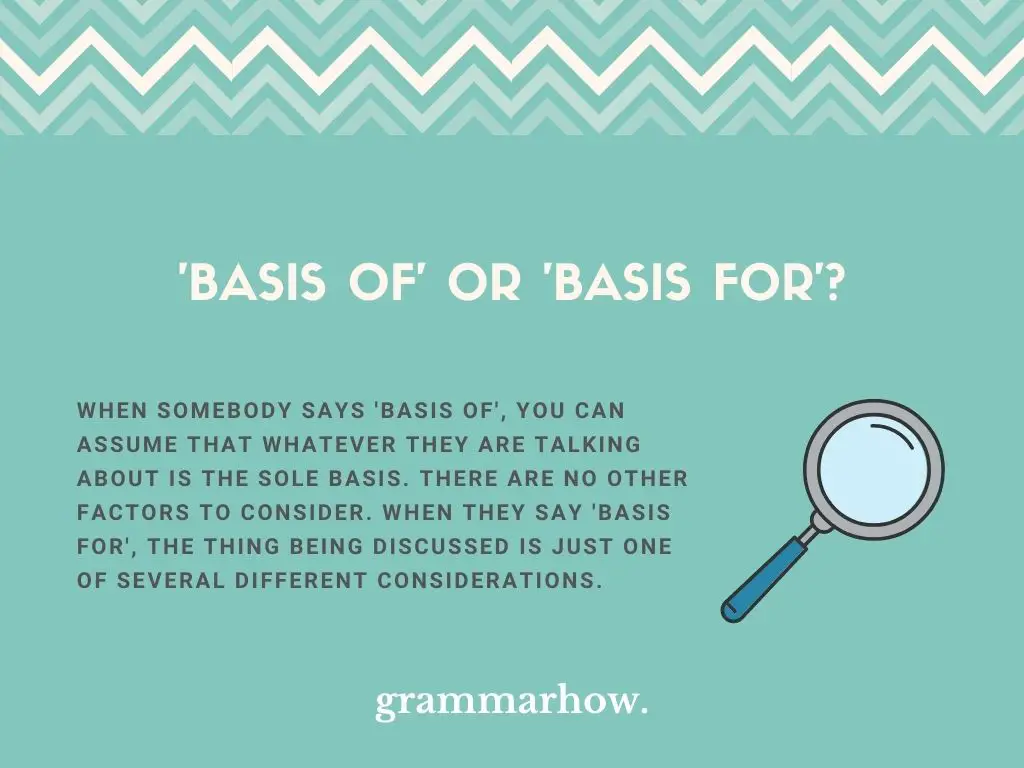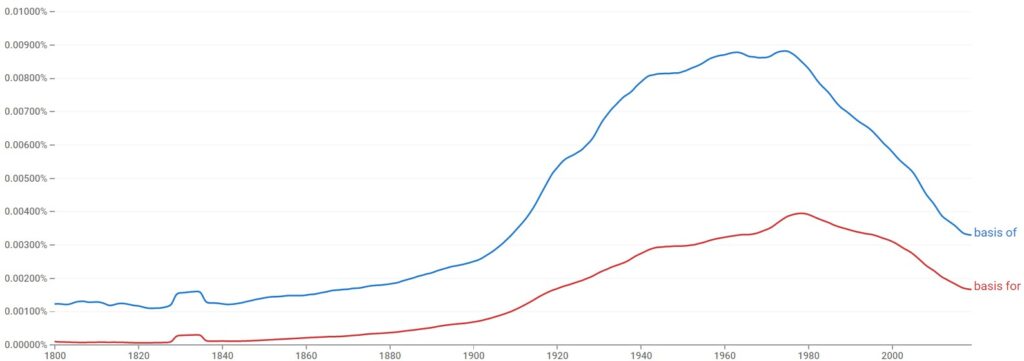The phrases ‘basis of’ and ‘basis for’ tend to get confused by English learners. Although, don’t fret. They give a few issues for those who have been learning English their entire life too. On this page, we want to go through the differences between the two!
‘Basis Of’ or ‘Basis For’?
When somebody says ‘basis of’, you can assume that whatever they are talking about is the sole basis. There are no other factors to consider. When they say ‘basis for’, the thing being discussed is just one of several different considerations.

We know that this description may be a little bit difficult to wrap your head around, so let’s make things clearer using a couple of examples. The sentences here are not 100% accurate (but they are grammatically correct), but it should allow us to explain the concepts a little better.
- The foundation is the basis of a home’s construction.
- A home’s bricks are the basis for a good home.
As you know, a home is constructed on the foundations. If you don’t have that foundation in place, nothing else can be constructed. The bricks, on the other hand, are part of a construction. They are just one of many different factors in place. Therefore, you would say ‘basis for’.
Technically, while ‘basis for’ and ‘basis of’ do mean slightly different things, they can be interchangeable. There won’t be too many people out there who are concerned that you use ‘of’ instead of ‘for’. In fact, it is likely that there aren’t too many people, native English speakers included, that even know that there is a difference between the two.
Basis Of
‘Basis of’ is used when something is considered the sole factor in something. Think of it as the absolute base. Without that base, nothing else would exist. It is the only factor that needs to be considered. No other factors really matter here.
When somebody says ‘basis of’, you can assume that anything that follows the word ‘of’ is the only thing being considered. For example, if you had a meeting about an email, then you could say “this email is the basis of our meeting”.
Here are a few ways that you can use ‘basis of’ in a sentence, which should give you more of an idea of how the phrase works in a sentence. If you read these examples, you will notice how, in each case, the factor being discussed is the only thing that would be considered:
- Your work performance will form the basis of our meeting.
- The cost of the product was the basis of the purchase.
- The manager’s decisions were the basis of the team selection.
- The pupil’s grades were the basis of why they got selected for university.
- The quality of the teabag is the basis of a good cup of tea.
Basis For
The phrase ‘basis for’ is when several different factors are being discussed as forming the ‘base’ of something i.e. the factor is one of several different building blocks. Whatever follows the word ‘for’ is not the sole factor, but it is an important factor.
When somebody says ‘basis for’, you can assume that whatever they are discussing is just one of a few things that are being considered. They may even give you a list. However, if that list is exhaustive (i.e. no others will be considered), then ‘basis of’ is often used instead.
Here are a few examples of how ‘basis for’ can be used in a sentence: We want to draw special attention to example 2. You will notice how we included a similar example in the previous section. When this phrase is used alongside ‘basis of’, it means that price was the only consideration. In our example, price is one of several things being considered (as indicated by the use of ‘basis for’)
- The job interview is the basis for hiring.
- The price of the product was the basis of the purchase decision.
- Your Swedish language skills are the basis for being hired for our customer service team.
- Meat and pasta are the basis for a good lasagne.
- Good quality wood is the basis for any quality table.
What Is Used the Most?
According to Google Ngram Viewer, the phrase ‘basis of’ gets a lot more use than ‘basis for’, although it is worth noting that ‘basis for’ only really started to be used in the 1920s, and it has never been a massively used phrase.

The use of both of these phrases has been falling since the 1980s. However, don’t worry. You are still likely to see them used in written text, and a lot of people will use the phrases in their day-to-day discussions, particularly in the world of business.
Is It ‘Form The Basis Of’ or ‘Form The Basis For’?
This will be dependent on the context. You would use the phrase ‘form the basis of’ if whatever follows is the sole consideration and that everything else extends from that. You use ‘form the basis for’ when there are multiple factors considered, but not all factors need to be mentioned.
Here are two examples. Both of these are correct. The first example indicates that being offered an interview is based purely on qualifications. The second example indicates that hiring is based on multiple factors, including the interview.
- Your qualifications will form the basis of interview selection.
- The interview will form the basis of our hiring decision.
Is It ‘On The Basis Of’ or ‘On The Basis For’?
While ‘on the basis for’ is technically correct, this is a phrase that you are unlikely to ever find used. This means that ‘on the basis of’ should almost always be the option that you select. The idea is that whatever follows the ‘of’ is the literal base everything is built upon.
Here are some examples, just to show you how ‘on the basis for’ doesn’t read correctly:
- On the basis of your interview, we want to offer you a job. (correct)
- On the basis for your interview, we want to offer you a job (incorrect)
Is It ‘Basis of Comparison’ or ‘Basis For Comparison’?
Both ‘basis of comparison’ and ‘basis for comparison can be used. You would use ‘of’ when you are comparing multiple things based on a single factor. You would use ‘basis for comparison’ when you are comparing based upon multiple factors.
It is worth noting that these two phrases are often used interchangeably. You will find them frequently used in science-focused and other educational papers.
Here are some example sentences so you can see what we mean. Both of these are correct. The first example indicates that the build quality is the only feature being compared, while the latter indicates build quality is not the only factor.
- The build quality was the basis of comparison between the two tables.
- The build quality was the basis for comparison between the two tables.

Martin holds a Master’s degree in Finance and International Business. He has six years of experience in professional communication with clients, executives, and colleagues. Furthermore, he has teaching experience from Aarhus University. Martin has been featured as an expert in communication and teaching on Forbes and Shopify. Read more about Martin here.
